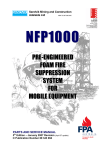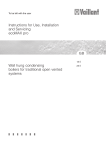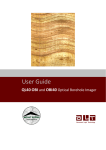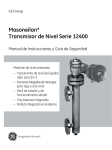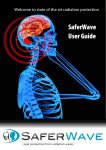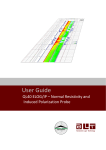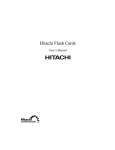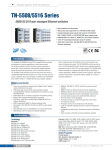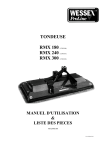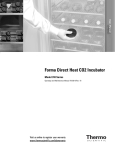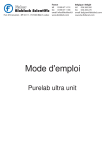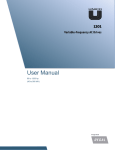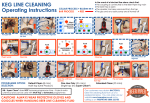Download 69-343-120 E500 Manual, 2nd Edition, August 06 issue
Transcript
Sandvik Mining and Construction ABN 73 007 980 645 Adelaide Ltd E500 PRE-ENGINEERED LIGHT VEHICLE FOAM FIRE SUPPRESSION SYSTEM © Publication Number 69 343 120 2nd Edition – Released August 2006 ALL INFORMATION CONTAINED WITHIN THIS MANUAL IS SUBJECT TO CHANGE WITHOUT PRIOR NOTICE. Sandvik Mining and Construction Adelaide Ltd reserve the right to revise and improve the product at any time. This publication describes the product at the time of issue and may not reflect the current product. Copyright © 2006 SANDVIK Apart from any use permitted under the Copyright Act, no part of this manual may be reproduced by any process, or any other exclusive rights exercised, without the written permission of SMC Adelaide Head Office, 136 Daws Road, Melrose Park SA 5039, Australia. (08) 8276 7655 SANDVIK E500 FIRE SUPPRESSION SYSTEM TABLE OF CONTENTS GENERAL SYSTEM DESCRIPTION PAGE 4 PRECAUTIONARY NOTICES PAGE 5 SYSTEM OPERATION PAGE 6 SYSTEM INSTALLATION PAGE 7 SYSTEM COMMISSIONING PAGE 11 RECHARGING INSTRUCTIONS PAGE 12 SERVICE KITS PAGE 13 CHARGING RIG OPERATING INSTRUCTIONS PAGE 14 MAINTENANCE AND SERVICING SCHEDULE PAGE 15 SERVICE FREQUENCY - AGGRESSIVE ENVIRONMENTS PAGE 16 ANNUAL SYSTEM SURVEY PAGE 16 SERVICE TAG MARKING PAGE 16 SERVICING AFTER SYSTEM DISCHARGE PAGE 17 SPARE PARTS - SYSTEM PAGE 18 SPARE PARTS - HEAD ASSEMBLY PAGE 20 SPARE PARTS - CYLINDER ASSEMBLY PAGE 22 SPARE PARTS - TEE AND SPRAY ASSEMBLIES PAGE 23 SPARE PARTS - CHARGING RIG PAGE 24 WARRANTY CONDITIONS PAGE 26 WARRANTY REGISTRATION PAGE 27 MATERIAL SAFETY DATA SHEET - AFFF 6% FOAM PAGE 29 MATERIAL SAFETY DATA SHEET - FFFP 6% FOAM PAGE 32 PERSONAL NOTES AND REMARKS PAGE 36 AUTHORISED SERVICE CENTRES nd 2 Edition - August 2006 © Publication number 69 343 120 BACK COVER Page 3 SANDVIK E500 FIRE SUPPRESSION SYSTEM General system description The E500 is a fixed, self-contained, independent foam based fire suppression system for all types of small vehicles, mobile plant and equipment. It was specifically designed to extinguish hydrocarbon fuel and oil fires (class B - liquid based) by spraying Aqueous Film Forming Foam (AFFF) from four (4) strategically placed full cone spray nozzles (FFFP organic protein base foam is available on request). When a hydrocarbon fuel is ignited, it is not the fuel, but the vapours that are burning. For the fire to sustain combustion, 4 elements are required: Fuel, oxygen, heat and the resulting chain reaction if these three are combined. If any of these are eliminated, the fire will go out. The function of the foam is to cut off the oxygen supply, act as a vapour seal over the fuel and at the same time reduce the risk of reignition by cooling the area with the water in the foam solution. The system is completely independent of the vehicle and once charged is on continuous standby, ready for use in the event of an on-board fire. The flexibility of the E500 design allows it to be custom fitted to a variety of different types of small equipment that have a requirement for fire protection. The system is very basic and not suitable for applications where functions such as automatic detection, automatic activation or automatic engine shutdown are required. The same applies to applications where a larger capacity storage vessel with additional spray nozzles is required to protect all the risk areas. For a more sophisticated system that has all of these features, please ask us about our NFP1000 system. The E500 system consists of a pressurised (Nitrogen - 1200 kPa) stainless steel cylinder, a head assembly (control valve) mounted on the cylinder and a loop of hose with four nozzles to cover potential fuel or heat sources (high risk areas), potential ignition points and provide general foam blanket coverage over the vehicle engine. The system is activated manually from the valve on the cylinder or electrically from a switch in the cab. The cylinder is fitted near the driver or operator of the equipment in an easily accessible location. Only the system cylinder is pressurised, ie there is no stored pressure in any of the system hoses. Once charged, the system is on continuous stand-by, ready for discharge at any time. Operating the ball valve handle on the head assembly or the electric switch in the cab releases the cylinder contents and each nozzle sprays a full cone pattern of foam over the target area. A pressure indicator located on the head assembly (on cylinder) shows the system pressure and confirms discharge when activated (instant pressure drop). The green band on the gauge face represents the normal operating range of the system. All hose fittings are re-useable type and therefore no special tooling is required. All fittings used are corrosion resistant. The nozzles, hose fittings and head assembly are all made from Brass and the cylinder from stainless steel. The system operates on the principle of direct activation. There is no complicated mechanism and therefore only minimal maintenance is required. Charging is simple and quick (water, foam and Nitrogen), resulting in almost no downtime and therefore gives you a system that has very low running costs. nd 2 Edition - August 2006 © Publication number 69 343 120 Page 4 SANDVIK E500 FIRE SUPPRESSION SYSTEM PRECAUTIONARY NOTICES ♦ ♦ ♦ ♦ ♦ ♦ ♦ ♦ ♦ ♦ ♦ ♦ ♦ ♦ ♦ OH&S REQUIREMENTS AND PROCEDURES MUST BE FOLLOWED AT ALL TIMES. THE E500 IS A FIRE SUPPRESSION, NOT FIRE EXTINGUISHING SYSTEM AND INSTALLATION OF SUCH A SYSTEM DOES NOT CANCEL ANY EXISTING REQUIREMENTS FOR ON BOARD HAND HELD FIRE EXTINGUISHERS. ALL INSTALLATION, COMMISSIONING AND SERVICING MUST BE CARRIED OUT BY COMPETENT PERSONNEL IN ACCODANCE WITH THE INSTRUCTIONS NOTED WITHIN THIS MANUAL. THIS IS A STORED PRESSURE TYPE SYSTEM THAT CONTAINS PRESSURISED NITROGEN AND MUST ALWAYS BE CONSIDERED CHARGED. ALWAYS RELIEVE PRESSURE PRIOR TO REMOVING ANY PART OF THE SYSTEM. USE ONLY SPECIFIED RECHARGING AGENTS. THE USE OF ALTERNATIVE EXTINGUISHING AGENTS MAY IMPAIR EFFICIENCY OR CAUSE MALFUNCTION. ENSURE THAT CORRECT SPECIFIED RATIO OF EXTINGUISHING AGENT IS ADDED TO GUARANTEE OPTIMUM FOAM GENERATION ON DISCHARGE. SYSTEM SHOULD BE ACTIVATED AND FULLY DISCHARGED AS PER SERVICING SCHEDULE TO AVOID DETERIORATION OF PRE-MIXED WATER/FOAM SOLUTION. RECHARGING SHOULD ONLY BE CARRIED OUT USING SPECIFIED NITROGEN CHARGING ASSEMBLY Part No. 69-334-080. OTHER RECHARGING APPARATUS ARE NOT RECOGNISED BY THE MANUFACTURER AND MAY CAUSE INJURY. REGULAR MAINTENANCE AND SERVICING IS IMPERATIVE. THIS MANUAL CONTAINS A SCHEDULE WITH THE MINIMUM REQUIREMENTS. NON COMPLIANCE WITH THIS SERVICING SCHEDULE MAY VOID WARRANTY. DAMAGED HOSES OR FITTINGS SHOULD BE REPLACED IMMEDIATELY TO ENSURE SYSTEM REMAINS FULLY OPERATIONAL. CYLINDER MUST BE HYDROSTATICALLY TESTED IN ACCORDANCE WITH THE REQUIREMENTS SPECIFIED WITHIN THIS MANUAL AND IN COMPLIANCE WITH THE RELEVANT STANDARDS AND REGULATIONS. PLEASE NOTE THAT STANDARDS AND REGULATIONS ARE CONTINUOUSLY REVIEWED AND COMPLIANCE MUST BE WITH LATEST ISSUE OF THE RELEVANT AUSTRALIAN STANDARDS AND REGULATIONS. THE E500 IS A PRE-ENGINEERED SYSTEM AND ANY USE OF NON-GENUINE PARTS WILL AUTOMATICALLY VOID ALL WARRANTY. COMPONENTS HAVE BEEN CUSTOM DESIGNED FOR THE E500 SYSTEM AND SHOULD NOT BE USED IN ANY OTHER APPLICATION. ABOVE PRECAUTIONARY NOTICES MUST BE READ IN CONJUNCTION WITH THE SERVICING PROCEDURES, WARRANTY TERMS AND CONDITIONS IN THIS MANUAL. nd 2 Edition - August 2006 © Publication number 69 343 120 Page 5 SANDVIK E500 FIRE SUPPRESSION SYSTEM System operation A. IN CASE OF FIRE When a fire starts, the way you react is very important. As soon as you become aware of the fire, do the following things: If you are in no immediate danger, turn off the engine. If at all possible, do not leave the equipment or machinery running as this may add more fuel to the fire, causing it to grow and spread much faster. If you are in the vehicle, lift the red cover of the fire suppression system activation switch on the vehicle dashboard and operate the switch to initiate the foam discharge. If electric activation fails as a result of the fire, or if you are already outside the vehicle, turn the valve handle on the head assembly (mounted on the cylinder) anti-clockwise to activate the fire suppression system. Retreat from the area quickly and raise the alarm. Stand by with portable fire extinguisher where possible to prevent re-ignition of fire or to extinguish fire outside the protected area of the fire suppression system. B. EXPLANATION Quickly retreat from the fire to protect yourself against wind blown flames, smoke, gases and other dangers created by the fire. Fires are very unpredictable and can turn suddenly, flare up or turn into a fireball by sudden ignition of large quantities of fuel. Keep your distance until the fire has been knocked down by the suppression system. Residual heat from the fire could cause re-ignition after the system has discharged. It is therefore important that someone remains on stand-by at a safe distance with a portable fire extinguisher, until expert attention (fire crew) has arrived or there is no possibility of re-ignition. C. AFTER THE FIRE IS OUT The engine should not be restarted until the equipment and fire suppression system have been inspected, repaired, cleaned and serviced to ensure the fault that caused the fire has been rectified and the fire suppression system is fully operational. Immediately recharge the Fire Suppression System. … YOU’VE NEEDED IT ONCE … YOU MAY NEED IT AGAIN! No fire is too small for a Fire Suppression System to be operated - All fires start small. The primary function of the E500 fire suppression system is to protect life and it is therefore imperative that it is serviced and maintained at regular intervals and in accordance with the minimum requirements specified in this manual to provide continued protection and peace of mind for the owner and operator of the equipment. nd 2 Edition - August 2006 © Publication number 69 343 120 Page 6 SANDVIK E500 FIRE SUPPRESSION SYSTEM System installation A. General Installation plays an important role in the efficiency of any fire suppression system. An unprofessional installation, in the worst case, could render the fire system inoperable. The following guidelines have been compiled as a reference to ensure that all installations are carried out to a common standard and the final product will meet with our high standards of design and workmanship. V B. Installation H The first step is to mount the bracket for the cylinder. It is important to locate the cylinder in an easily accessible area. Consider that you will require access for service and maintenance, ie the gauge on top of the cylinder must be clearly visible and the cylinder should be removable for servicing. L2 C B L1 The cylinder must be mounted in an upright position. The system is not designed for horizontal mounting of the cylinder and doing so will render the system ineffective. Unlock clamp band(s) A and remove the cylinder C from bracket B. Please note that a variety of brackets are used and the picture shown may not be of the bracket supplied with your kit. A Picture cylhdbktassy.jpg Bolt bracket B to the framework (weld only if there is no other way) of the equipment. Consider access for servicing and manual system activation. When bracket B is installed, fit cylinder assembly C. Check that head H is fully screwed in, turn the cylinder to a position where the pressure indicator is clearly visible and secure it with the clamp band(s) A. Attach main cylinder label L1 to the front of the cylinder (label is supplied loose). Label must be fully visible (not obstructed by the mounting bracket clamp band) and must not cover any of the blue cylinder identification band. Attach the manual activation label L2 above the blue band (label supplied loose). Position the label so it is legible from where the operator would stand to manually activate the system from the valve V on the head assembly. nd 2 Edition - August 2006 © Publication number 69 343 120 Page 7 SANDVIK E500 FIRE SUPPRESSION SYSTEM System installation B. Installation (continued) The next step is to install the electric activation switch on the dashboard of the vehicle (on driver side). It must be positioned within easy reach of the driver and with the layout of the wiring in mind (access). Install the switch horizontally, with the cover hinge on the left and the label legible (as shown in picture). Picture switch.jpg The electrical part (wiring) of the switch must be done by a licensed and qualified electrician. Switch must be powered so that it is operational at all times, even with the engine stopped (from a source that is powered directly from the battery). The switch is to be connected to the solenoid on the head assembly, which is mounted on the cylinder. All cabling between the solenoid and the switch must be run through conduit (included in the kit). Electrical wiring can be done as a last step, just prior to system commissioning. If the cylinder is mounted where it is exposed to the elements, the electrical part of the solenoid valve must be wrapped with protective weather proof tape after the valve has been successfully tested for operation (after the commissioning of the completed system). The next step is to install the four (4) spray nozzle assemblies D. All the nozzles must be mounted in a closed ring main layout to give optimal flow to give best performance. The picture below is a basic arrangement of a ring main. Picture M343055a.gif Remove all of the plastic nozzle caps and do not fit them again until all testing and commissioning is completed. nd 2 Edition - August 2006 © Publication number 69 343 120 Page 8 SANDVIK E500 FIRE SUPPRESSION SYSTEM System installation B. Installation (continued) The picture below shows a typical schematic layout of the ring main. An elbow R is used to allow the main feed line tee to be located in the corner of the ring main. A second elbow S is used to avoid having a tight hose bend that could cause kinking in the ring main hose. Only 2 of the nozzles have 45 degree elbows fitted. R Picture ringmain.jpg S Place spray nozzle assemblies around the area that you wish to protect, loosen locknuts G and point nozzles toward turbo, fuel pump, exhaust manifold, starter motor, alternator or any other possible ignition or fuel source. Remove the nozzle elbow if not required (direct spray coverage is acceptable). Direct the nozzles so that the spray pattern overlaps to give complete coverage over the whole engine. Secure all spray nozzle assemblies in place with mounting brackets E. Bolt brackets, don’t weld. Use existing holes or bolts on vehicle wherever possible. All nozzles F and nozzle elbows G must be secured with Loctite 569 to prevent them from vibrating loose. Apply a single drop of Loctite 569 to male thread of nozzle F, screw the nozzle into the elbow and tighten. Remove excess Loctite immediately after tightening. E F LOCKNUT Screw locknut onto elbow G on as far as it goes. Apply a single drop of Loctite 569 to the male thread of elbow G and screw the elbow in as far as possible. Unscrew the elbow until the nozzle points in the desired direction and then tighten the locknut. Remove excess Loctite immediately after tightening. G Picture noz1.jpg S Use elbow S if required. If there is enough room to have a hose bend in a corner, do not use elbows. Picture nozelb1.jpg nd 2 Edition - August 2006 © Publication number 69 343 120 Page 9 SANDVIK E500 FIRE SUPPRESSION SYSTEM System installation B. Installation (continued) The last stage of the installation is the hosing. As mentioned previously, the nozzle assemblies must be hosed as a closed loop (ring main) to give even discharge from all nozzles. Keep hose lengths as short as possible. Avoid loops that may catch, however make the hoses long enough to avoid tight bends that may cause the hose to kink. Don’t run the hose over sharp edges as this will eventually cut through the hose. Feed line H from the head assembly must connect to leg of tee J into the ring main to avoid priority flow (as shown) and should be kept as short as possible. Priority flow is not desired as it results in uneven distribution of foam to the nozzles. Fitting K is connected to the head assembly. Kit contains elbow that may be fitted to ring main ends of tee J if entry point into ring main is in a corner of the engine bay. Same elbows can also be used for connection to corner nozzle assemblies D (between tee and hose tail). Measure hose lengths required by laying it along the actual path it will take. Cut the hose with a sharp knife or hose cutters. Push the hose fully onto hose tails of fitting K, nozzle assemblies D and feed line tee J. Secure all the hoses at regular intervals with the metal hose saddles L to prevent abrasion, kinking or other hose damage from movement caused by shock and vibration. Avoid the use of cable ties to secure the hoses as these are rarely replaced if they are ever removed. Picture 69343056a.gif Picture 69343056b.gif Providing the electrician has completed the wiring of the activation switch, the installation is now complete. The system is ready to be tested & commissioned. Follow the checklist on the next page to confirm that system has been installed correctly and is fully operational. Picture 69335056d.gif nd 2 Edition - August 2006 © Publication number 69 343 120 Page 10 SANDVIK E500 FIRE SUPPRESSION SYSTEM System commissioning Commissioning check list The following is a checklist that should be followed to ensure the system has been installed correctly and is fully operational. (Tick boxes) Check that the cylinder is mounted securely and the bracket is bolted or welded in place. Cylinder orientation must be upright (vertical). Check that hoses installed are not exceedingly long. Check that all hoses are secured and clamped in place leaving no loose loops. Check that none of the hoses run over sharp edges or corners. Check that the nozzles are installed in the form of a ring main. Check that all nozzle mounting brackets are secured (preferably bolted) and the nozzles are mounted correctly to give overall coverage for the whole engine. Check that the cylinder is located so it is easily accessible for servicing. Check that the pressure indicator on the head assembly is clearly visible. Check that all instruction labels are attached, clearly visible and legible. Charge the system with 9.6 litres of water, pressurise it with Nitrogen to 1200kPa. Check head and charging valve (loose valve core) for leaks. Activate the system manually. Observe nozzle spray pattern and record discharge time. If spray pattern is not satisfactory, adjust spray direction of nozzle(s). During above discharge also check all hoses and fittings for leaks. Test electric activation. Recharge with water only as per above. Repeat discharge test, but this time activate the system electrically with the switch in the cab. Empty cylinder of any remaining fluid before recharging. Charge the system with foam concentrate and water according to the recharging instructions on the cylinder label, or the section on recharging in this manual. Fit the plastic caps to all the nozzles and ensure they are secure. Fit anti-tamper seal to the valve handle on the head assembly. Check that charging connection has cap fitted. Mark the system service tag (attached to head) with the date of commissioning. The system is now installed, commissioned and ready for operation. For continued good system performance and operator safety, the system must be checked and serviced on a regular basis. A comprehensive maintenance schedule is included in this manual. This schedule lists minimum requirements according to Australian Standards and must be followed to give continued protection of life and property. nd 2 Edition - August 2006 © Publication number 69 343 120 Page 11 SANDVIK E500 FIRE SUPPRESSION SYSTEM Recharging instructions For good system performance and operator safety, the recharging instructions shown below must be followed at all times. Any problems found must be rectified before the system is recharged. This procedure is also noted on the main cylinder label. As this technical manual may not be available at the time of servicing, the condition of the label is important. If the main cylinder label is damaged or no longer clearly legible, it must be replaced immediately. To recharge the system, proceed as follows: Open the valve on the head assembly (turn yellow handle anti-clockwise) to release any possible remaining pressure in the system. Disconnect the delivery hose from the head assembly, undo the clamp band and remove the cylinder from the mounting bracket. Remove the head assembly from the cylinder. Flush the cylinder and head assembly with clean water. Flush out all the hoses with clean water and check that the nozzles operate correctly. Clean the nozzles if required. Replace if necessary (blocked solid). Establish what caused the system discharge and rectify any problems. Drain cylinder. CYLINDER MUST BE EMPTY BEFORE RECHARGING. Fill the cylinder with 9.0 litres of potable water first, then add 0.6 litres of foam concentrate (6% AFFF or 6% FFFP, whichever is specified on cylinder label). Check the sealing surface and O-ring seal for any obvious signs of damage. Check that siphon tube is secure, then screw head assembly onto cylinder. Turn yellow valve handle on head assembly clockwise to closed position. Check that activation switch in cab is in the OFF position (cover closed). Charge the cylinder with Nitrogen (do not use compressed air!) through the charging connection on the head assembly until the master gauge registers the correct working pressure of 1200kPa at 23º ±2ºC. Fit plastic caps to all nozzles. Replace the safety tie on the head assembly. Slip the tie through the small hole in the left hand side of the valve handle and around the top of the head (between hose tail nut and yellow hose end cover). The tie should be tight to make it impossible to open the valve without breaking the tie. Record recharging details on the attached service tag. (See maintenance and service section of this manual for tag marking). nd 2 Edition - August 2006 © Publication number 69 343 120 Page 12 SANDVIK E500 FIRE SUPPRESSION SYSTEM Recharging instructions WARNING RECHARGING SHOULD ONLY BE CARRIED OUT USING SPECIFIED APPROVED NITROGEN CHARGING RIG ASSY PART No. 69 334 080. OTHER APPARATUS ARE NOT RECOGNISED BY THE MANUFACTURER AND MAY CAUSE INJURY. For a breakdown of the above-mentioned charging assembly, refer to spare parts listing of the charging rig in this manual. For charging rig operating instructions see next page. Service kits To assist with regular maintenance, the following service kits are available: SERVICE KIT No. 69-344-460 (Standard) E500 - 6% AFFF – 12 MONTH SERVICE Contains all components required to carry out a regular yearly service. SERVICE KIT No. 69-344-470 (Alternative) E500 - 6% FFFP – 12 MONTH SERVICE Contains all components required to carry out a regular yearly service. Above kits contain the following: nd 2 Edition - August 2006 Foam concentrate (6%). Safety ties for valve handle. Dust caps for nozzles. Dust cap for pressure relief valve O-ring for cylinder head. Valve core for charging valve. © Publication number 69 343 120 Page 13 SANDVIK E500 FIRE SUPPRESSION SYSTEM Charging rig operating instructions Picture 69343098-E500.gif Check that low-pressure regulator is turned off. Connect regulator line to left-hand fitting. Close right valve. Open left valve. Adjust regulator until gauge between valves shows required charging pressure. Connect charging line to charging connection on cylinder head valve. Slowly open right valve to pressurise the cylinder. Opening the valve too quickly may damage the equipment and cause injury. Close left valve to check cylinder pressure. Note position of indicator needle on cylinder head. Close right valve and disconnect charging line from charging connection on cylinder head valve. Check that position of indicator needle on cylinder head valve has not changed. If pressure has dropped, reconnect charging line and repeat procedure. PLEASE NOTE: The gauge on this charging rig must be calibrated at three (3) monthly intervals to ensure accuracy and to comply with Australian Standard AS 3676 - section 5. nd 2 Edition - August 2006 © Publication number 69 343 120 Page 14 SANDVIK E500 FIRE SUPPRESSION SYSTEM Maintenance and servicing System maintenance & servicing is the purchasers, owners and operators responsibility. Requirements given in this section of the manual are minimum requirements. Requirements for cylinder are based on AS1851-2005 (Section 15) and all checks and serviced must be recorded and filed. Faults or damage must be reported immediately. MAINTENANCE AND SERVICING SCHEDULE daily (operator) 6 monthly yearly 5 yearly Check that pressure indicator on the head is legible, operating correctly and is registering in the green operating zone (1050 to 1500kPa). 9 9 9 9 Check that anti-tamper tie on head assembly valve handle is intact. 9 9 Check the weight of the cylinder to confirm it is fully charged. 9 9 9 9 9 9 9 9 9 Check that cylinder is clean, all instruction labels are clearly legible and the maintenance record tag is firmly attached. 9 9 9 Check that cylinder label indicates correct type and quantity of foam concentrate required. 9 9 9 Check that cylinder and cylinder mounting bracket are secure. Check hoses and fittings for signs of damage where possible. 9 9 9 9 9 9 9 9 9 9 9 9 Check that all nozzle caps are in place. If not, then clean the nozzle(s) and fit replacement cap. 9 9 9 Activate the system electrically (switch in cab). Check that discharge is in accordance with requirements and nozzles perform satisfactory. 9 9 Check the full system for any signs of leaks. Check all hoses and fittings for free passage by flushing with water. 9 9 9 9 Check that threads, seals and seal faces on head assembly and cylinder are in good condition. 9 9 Check that siphon tube is securely attached to head assembly and free of obstructions or signs of damage. 9 9 Check actuation valve for corrosion and free movement of valve handle. Check that interior or exterior of cylinder is not pitted by corrosion. 9 9 9 9 9 9 Replace valve core on all charging connections. Lubricate valve core seals with Molykote111. 9 9 Recharge with fresh foam in accordance with recharging instructions. 9 9 9 9 9 9 Check that system activation points are readily accessible. Check cylinder assembly and head assembly for signs of damage. Check that no system components are damaged, corroded or loose. Check wiring of electric activation switch. Discard all nozzle caps and fit new nozzle caps. Replace head assembly O-ring. Subject the cylinder to a hydrostatic test of 2.0 MPa or the marked periodic test pressure nominated on the cylinder, whichever is greater. Cylinders failing the hydrostatic test must be replaced. Record the service on the service tag and in logbook as required. 9 9 9 9 Servicing must be carried out in accordance with above Schedule to comply with Sandvik warranty conditions. NON COMPLIANCE WITH ABOVE SCHEDULE MAY VOID WARRANTY. Please refer to next page for further maintenance and servicing requirements. nd 2 Edition - August 2006 © Publication number 69 343 120 Page 15 SANDVIK E500 FIRE SUPPRESSION SYSTEM Maintenance and servicing In addition to the maintenance and servicing as per the schedule on the previous page, please carry out the following additional requirements: Aggressive environments For systems that are operating in aggressive environments, it is strongly recommended to perform more frequent maintenance than what is specified in the table on the previous page: Carry out the 6-monthly service at 3 month intervals. Carry out the annual service at 6 month intervals. Carry out the 5-yearly service (hydrostatic test) at 3 yearly intervals. Corrosive atmospheres, salt spray, exposure to extremes of temperature, abnormally high humidity or intense vibrations are all considered aggressive environments. Most mining and construction (industrial in general) applications would fall into this category. More frequent servicing is also recommended for areas where only hard or poor quality water is available to charge the cylinder. Annual system survey As part of the general maintenance regime, an annual survey must be carried out to confirm that the fire suppression system is still fit for purpose: Check that the fire hazard/risk to be protected has not changed and that the system fitted is appropriate for the application. Check that no alterations have been made to the fire system that could adversely affect the fire system operation or performance. Check that no alterations have been made to the vehicle that could impede access to the fire system activation points or affect the system performance. Service tag marking Service tags are to be punched or stamped as follows: • • • • • Punch a hole to indicate the date of installation and commissioning. Figure “1” denotes 6 month service. Figure “2” denotes 1 year service. Figure “4” denotes 5 year service (hydrostatic test). Figure “5” denotes service after system discharge. Servicing must be carried out in accordance with the given Maintenance and Servicing requirements to comply with Sandvik warranty conditions. NON COMPLIANCE WITH REQUIREMENTS MAY VOID WARRANTY. nd 2 Edition - August 2006 © Publication number 69 343 120 Page 16 SANDVIK E500 FIRE SUPPRESSION SYSTEM Servicing after system discharge If the system has been activated or accidentally discharged, the system is to be serviced by accredited personnel as per the check list below: Check list for servicing after a system discharge INSPECTION CHECK • Ask the driver of the vehicle if he knows why the system has discharged. (accidental, fire, etc ) • If the reason for the discharge can be determined, proceed with the appropriate action (recharge or repair and recharge). • If the reason is unknown, proceed with fault finding and trouble shooting to determine the cause of the discharge. • Rectify any system related problems found. If the discharge was due to a vehicle related problem, make recommendations to owner for appropriate action to eliminate cause of problem. • If the problem was due to faulty manufacture of part(s), please record the details and forward the faulty parts and a copy of your report to SMC Adelaide (Head Office). • Carry out a standard yearly service and recharge the system. • Record this service on the service tag by stamping the figure “5” in the appropriate date field of the tag. Write service details into site logbook as required. IMPORTANT IF SYSTEM WAS ACTIVATED TO SUPPRESS A FIRE, ALL PARTS SHOWING SIGNS OF FIRE DAMAGE MUST BE REPLACED. nd 2 Edition - August 2006 © Publication number 69 343 120 Page 17 SANDVIK E500 FIRE SUPPRESSION SYSTEM Spare parts listing - System Picture 69343058d.jpg E500 SYSTEM (complete kit) nd 2 Edition - August 2006 © Publication number 69 343 120 Page 18 SANDVIK E500 FIRE SUPPRESSION SYSTEM Spare parts listing - System E500 FIRE SUPPRESSION SYSTEM (complete kit) CONTAINS ALL ITEMS LISTED BELOW ITEM PART NO. QTY DESCRIPTION 1 69-344-450 1 CYLINDER ASSEMBLY (see details overleaf) 2 69-344-500 1 HEAD ASSEMBLY (see details overleaf) 3 69-335-549 1 SIPHON TUBE (rigid) 4 69-335-361 1 MOUNTING BRACKET (extinguisher bracket) (4) 69-335-415 (1) 5 69-334-755 1 (5) 69-334-750 (1) Alternative FFFP foam charge (not shown) (5a) 69-335-492 (1) FFFP OVERSTICKER (for AFFF cylinder label) 6 69-334-760 1 TEE ASSEMBLY (see details overleaf) 7 69-334-780 4 SPRAY ASSEMBLY (see details overleaf) 8 69-335-364 11 SADDLE (for -6 hose) 9 69-335-360 11m 10 69-335-320 1 LABEL, ARROW (not shown) 11 69-335-547 2 ELBOW, ¼” BSP, M/F 12 69-335-213 1 NIPPLE, ¼” BSP 13 69-335-274 5m HOSE GUARD (not shown) 14 69-335-567 4m CABLE, 2 CORE, 4mm 15 69-335-568 4m CONV. TUBE, 7mm 16 69-335-001 1 TIE, SAFETY (not shown) 17 69-335-566 1 SWITCH, complete with cover 18 69-335-565 1 LABEL, SWITCH Alternative bracket with two clamp bands AFFF FOAM CHARGE (not shown) HOSE (-6) Please note that the pictorial presentation of the system shown to the left is a typical schematic layout only and may not be a true representation of an actual installed system layout. nd 2 Edition - August 2006 © Publication number 69 343 120 Page 19 SANDVIK E500 FIRE SUPPRESSION SYSTEM Spare parts listing - Head Assembly 11 12 13 9 Picture 69344500.jpg 10 17 12 8 14 8 4 16 3 2 1 5 6 7 15 12 HEAD ASSEMBLY for E500 system 69-344-500 nd 2 Edition - August 2006 © Publication number 69 343 120 Page 20 SANDVIK E500 FIRE SUPPRESSION SYSTEM Spare parts listing - Head Assembly HEAD ASSEMBLY 69-344-500 CONTAINS ALL ITEMS LISTED BELOW. ITEM PART NO. QTY 1 69-335-558 1 HEAD BODY 2 69-335-357 1 O-RING 3 69-335-234 1 PRESSURE INDICATOR 4 69-335-004 1 CHARGING CONNECTION 4a 69-335-107 (1) DUST CAP (part of item 4) 5 69-335-358 1 VENT VALVE ADAPTOR 6 69-335-074 1 VENT VALVE (2000kPa) 7 69-335-259 1 DUST CAP, RED 8 69-335-213 1 NIPPLE, ¼”BSP 9 69-335-203 1 BALL VALVE (without handle) 10 69-335-186 1 HANDLE, YELLOW 11 69-335-559 1 ELBOW, MALE, ¼” BSP x -6 12 69-335-368 3 HOSE END 3/8” x -6 13 69-335-360 0.14m 14 69-335-561 1 TEE, MALE, ¼” BSP x -6 15 69-335-562 1 SOLENOID VALVE 16 69-335-563 1 COIL, 12V DC 17 69-335-001 1 SAFETY TIE 18 69-335-242 1 SERVICE TAG (not shown) 19 69-335-325 2 RING FOR SERVICE TAG (not shown) NOTE: nd 2 Edition - August 2006 DESCRIPTION HOSE, 3’8” 1) All fittings are secured with Loctite 569, with the exception of items 12. 2) Apply Rubber grease to O-ring item 2 on assembly. © Publication number 69 343 120 Page 21 SANDVIK E500 FIRE SUPPRESSION SYSTEM Spare parts listing - Cylinder Assembly CYLINDER ASSEMBLY 69-344-450 NOMINAL CAPACITY - 12 LITRE CONTAINS ALL ITEMS LISTED BELOW. ITEM PART NO. QTY DESCRIPTION 1 69-335-548 1 CYLINDER (Stainless Steel) 2 69-335-564 1 LABEL, MAIN (2a) 69-335-492 (1) FFFP OVERSTICKER (for cylinder label of systems charged with FFFP foam) 3 69-335-281 1 LABEL, WARNING (mount upright only) 4 69-335-554 0.57m 5 69-335-354 1 BLUE STRIP (60mm wide) LABEL, ACTIVATION Picture 69344450.gif nd 2 Edition - August 2006 © Publication number 69 343 120 Page 22 SANDVIK E500 FIRE SUPPRESSION SYSTEM Spare parts listing - Tee and Spray Assemblies TEE ASSEMBLY 69-334-760 CONTAINS ALL ITEMS LISTED BELOW. ITEM PART NO. QTY DESCRIPTION 1 69-335-263 1 TEE, 1/4” 2 69-335-362 3 HOSE TAIL, 1/4” x -6 Picture M334760a.gif SPRAY ASSEMBLY 69-334-780 CONTAINS ALL ITEMS LISTED BELOW. ITEM PART NO. QTY DESCRIPTION 1 69-335-263 1 TEE, 1/4” 2 69-335-362 2 HOSE TAIL, 1/4” x -6 3 69-335-049 1 NOZZLE BRACKET 4 69-335-221 1 ELBOW, 1/4” x 45° 5 69-334-340 1 NOZZLE 6 69-335-048 1 DUST CAP Picture M334760b.gif nd 2 Edition - August 2006 © Publication number 69 343 120 Page 23 SANDVIK E500 FIRE SUPPRESSION SYSTEM Spare parts listing - Charging Rig Picture M334080c.gif CHARGING RIG 69-334-080 nd 2 Edition - August 2006 © Publication number 69 343 120 Page 24 SANDVIK E500 FIRE SUPPRESSION SYSTEM Spare parts listing - Charging Rig CHARGING RIG ASSEMBLY 69-334-080 CONTAINS ALL ITEMS LISTED BELOW. ITEM PART NO. QTY DESCRIPTION 1 69-335-071 1 1a 69-335-072 (1) NIPPLE, ¼” x –4 2 69-335-072 3 NIPPLE, ¼” x –4 3 69-344-150 6 HOSE END ASSEMBLY –4 Consists of 69-335-445 Hose Tail 69-335-446 Ferrule 69-335-159 O-Ring 4 69-335-444 7.5m 5 69-335-203 2 BALL VALVE (no handle) 6 69-335-186 2 HANDLE, WIDE, YELLOW 7 69-335-263 2 TEE, ¼” BSP, No.35E 8 69-335-073 1 GAS COUPLING 9 69-335-074 1 VENT VALVE 10 69-335-213 3 NIPPLE, ¼” BSP 11 69-335-259 1 DUST CAP 12 69-335-257 1 BUSH, 1/4"x 1/8” BSP, REDUCING 13 69-335-496 1 PLATE 14 69-335-497 1 LABEL, OPERATIGN INSTRUCTIONS 15 69-335-498 2 GAUGE, CALIBRATED 16 69-335-499 2 U-BOLT 17 69-335-500 1 CARRY CASE (not shown) INERT GAS REGULATOR HOSE, ¼” (-4) – see note below NOTE – 3 hose assemblies are supplied (1m, 1.5m and 5m), ie 7.5 metres total. OPTIONAL nd 2 Edition - August 2006 © Publication number 69 343 120 Page 25 SANDVIK E500 FIRE SUPPRESSION SYSTEM Warranty for Fire Suppression Systems 1. Sandvik Mining and Construction Adelaide Ltd (SMC Adelaide) warrants the product to be free from defects in materials and workmanship for a period of twelve (12) months from date of commissioning of the system or date of delivery of parts to the first user. 2. The obligation, statutory or otherwise, of this warranty is limited to the replacement or repair at a SMC Adelaide facility, or at a point designated by SMC Adelaide, of parts which are found upon inspection by SMC Adelaide at such point, to be defective in materials or workmanship. 3. Assemblies and components purchased and installed on the product by SMC Adelaide are included within this warranty, but will not be considered defective as units, and repair or replacement will be limited to the individual part proven defective. Any part so replaced will become property of SMC Adelaide. 4. Excluded from this warranty are : z Any product which has been altered or repaired in such a way, in SMC Adelaide’s judgment, as to affect the product adversely. z Repair or replacement of any part which has, in SMC Adelaide’s judgment, been subjected to damage through negligence, accident, abuse, improper use or storage. z Any product which has not been operated and maintained in accordance with normal practice and with the recommendation of SMC Adelaide. z Use of non-genuine spare parts. z Normal wear and tear. z Products damaged in shipment or otherwise without the fault of SMC Adelaide. 5. This warranty does not obligate SMC Adelaide to bear costs of labour, overtime labour, travel time, travel expenses or freight charges in connection with the replacement or repair of defective parts. 6. SMC Adelaide will not consider any claim for warranty unless notified within fourteen (14) days of the defect or end of warranty period, and parts subject to warranty are returned to SMC Adelaide facility for assessment at the purchasers risk and expense. 7. SMC Adelaide do not issue replacement product for warranty claims. Our policy is to credit customers’ account when the warranty claim has been processed and approved. Therefore if replacement product is required, a new order needs to be placed on SMC Adelaide. This order may be marked ‘subject to warranty’ if desired. 8. Subject to the Trades Practices Act (and any other relevant legislation) and to the fullest extent permitted by law, the liability of SMC Adelaide in respect of the product is limited in accordance with Clause 2 of this warranty and SMC Adelaide shall otherwise be under no liability to the purchaser, to any third party at law or in equity or pursuant to any statute rule or regulation or otherwise for any claims, demands, losses, damages, costs, expenses, deaths or injuries arising out of or in connection with the performance or non-performance of the product. nd 2 Edition - August 2006 © Publication number 69 343 120 Page 26 SANDVIK E500 FIRE SUPPRESSION SYSTEM Warranty registration Please fill in the warranty registration below and send to the following address : Sandvik Mining and Construction Adelaide Ltd Fire Protection Department P.O. Box 296 Melrose Park SA 5039 Australia WARRANTY REGISTRATION FORM E500 FIRE SUPPRESSION SYSTEM Date purchased : ................................ Where purchased : ..................................................................... Fire suppression system installed on : ....................................... ....................................................................................................... Date installed and commissioned : ............................................. Installation carried out by : .......................................................... Name and address : ..................................................................... ........................................................................................................ Date : ……….… Signature : ………………….…………….. Picture 69 343 060.TIF nd 2 Edition - August 2006 © Publication number 69 343 120 Page 27 SANDVIK E500 FIRE SUPPRESSION SYSTEM BLANK PAGE nd 2 Edition - August 2006 © Publication number 69 343 120 Page 28 SANDVIK E500 FIRE SUPPRESSION SYSTEM Material Safety Data Sheet – AFFF 6% (Standard foam) nd 2 Edition - August 2006 © Publication number 69 343 120 Page 29 SANDVIK E500 FIRE SUPPRESSION SYSTEM Material Safety Data Sheet – AFFF 6% (Standard foam) nd 2 Edition - August 2006 © Publication number 69 343 120 Page 30 SANDVIK E500 FIRE SUPPRESSION SYSTEM Material Safety Data Sheet – AFFF 6% (Standard foam) nd 2 Edition - August 2006 © Publication number 69 343 120 Page 31 SANDVIK E500 FIRE SUPPRESSION SYSTEM Material Safety Data Sheet – FFFP 6% (Alternative foam) nd 2 Edition - August 2006 © Publication number 69 343 120 Page 32 SANDVIK E500 FIRE SUPPRESSION SYSTEM Material Safety Data Sheet – FFFP 6% (Alternative foam) nd 2 Edition - August 2006 © Publication number 69 343 120 Page 33 SANDVIK E500 FIRE SUPPRESSION SYSTEM Material Safety Data Sheet – FFFP 6% (Alternative foam) nd 2 Edition - August 2006 © Publication number 69 343 120 Page 34 SANDVIK E500 FIRE SUPPRESSION SYSTEM Material Safety Data Sheet – FFFP 6% (Alternative foam) nd 2 Edition - August 2006 © Publication number 69 343 120 Page 35 SANDVIK E500 FIRE SUPPRESSION SYSTEM Personal notes and remarks nd 2 Edition - August 2006 © Publication number 69 343 120 Page 36 (BLANK PAGE) AUTHORISED SERVICE CENTRES For advice, service inquiries and locations of approved dealers Call 1300 737 740 30 or contact any of the Sandvik Mining and Construction Adelaide Ltd service workshops below. AUSTRALIA SMC Adelaide - ADELAIDE 136 Daws Road MELROSE PARK SA 5039 Phone: (08) 8276 7655 Fax: (08) 8276 8509 SMC Adelaide - BROKEN HILL 11 Kanandah Road BROKEN HILL NSW 2880 Phone: (08) 8088 2111 Fax: (08) 8088 4411 SMC Adelaide - KALGOORLIE 20 Broadwood Street KALGOORLIE WA 6430 Phone: (08) 9091 6300 Fax: (08) 9091 6003 SMC Adelaide - MOUNT ISA 4 Duke Street MOUNT ISA QLD 4825 Phone: (07) 4743 8111 Fax: (07) 4743 2635 SMC Adelaide - OLYMPIC DAM Gunson Street OLYMPIC DAM SA 5725 Phone: (08) 8671 0015 Fax: (08) 8671 0115 SMC Adelaide - PERTH 15 Magnet Road CANNING VALE WA 6155 Phone: (08) 9334 4100 Fax: (08) 9455 6800 SMC Adelaide - SINGLETON Unit 1, 44 Magpie Street SINGLETON NSW 2330 Phone: (02) 6572 2699 Fax: (02) 6572 2933 SMC Adelaide - TOWNSVILLE 133-135 Enterprise Street BOHLE QLD 4818 Phone: (07) 4774 4675 Fax: (07) 4774 4656 SMC Adelaide - BRISBANE 12 Archimedes Street DARRA QLD 4076 Phone: (07) 3375 3300 Fax: (07) 3375 3582 SMC Adelaide - ORANGE 19 Peisley Street ORANGE NSW 2800 Phone: (02) 6361 7600 Fax: (02) 6361 7610 SMC Adelaide - PILBARA 2/384 Tecoma Street TOM PRICE WA 6751 Phone: (08) 9143 3642 Fax: (08) 9189 3261 INDONESIA PT SDS Ausminco INDONESIA - JAKARTA Sudirman Square Office Towers Tower B, 19th Floor Jl. Jend. Sudirman Kav 45-46 JAKARTA 12930 Republic of Indonesia Phone: 0011 62 21 575 0961 Fax: 0015 62 21 575 0803 PT SDS Ausminco INDONESIA - BALIKPAPAN Jl. M.T. Haryono RT36 No. 185C BALIKPAPAN 76114 East Kalimantan Republic of Indonesia Phone: 0011 62 542 73 6066 Fax: 0015 62 542 73 3062






































